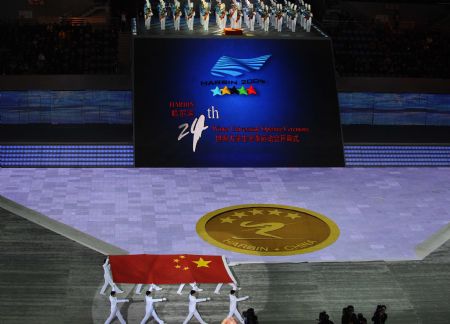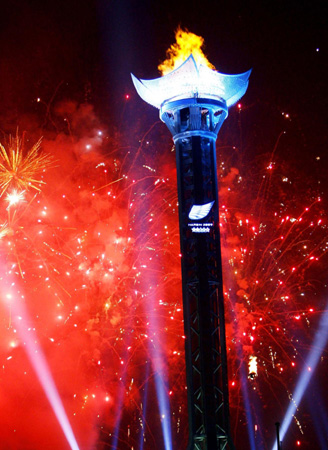Chinese state councilor Liu Yandong declared the 2009 World Winter University Games open on Wednesday evening, reeling off the biennial event here in China's northeastern 'Ice City'.

The flag of Winter University Games is escorted into Harbin International Conference, Exhibition and Sports Centre Gym at the opening ceremony of the 24th World Winter Universiade in Harbin, capital of northeast China's Heilongjiang Province, February 18, 2009. [Xinhua]
It's the first time that China staged such a world-class winter games, a grand one only second to Winter Olympic Games, and also the third time in Asia after Sapporo of Japan in 1991 and Chonju of South Korea in 1997.
The 11-day Harbin Universiade to run through Feb. 28, the 24th edition of the Games since 1960, offers a record number of gold medals for 81 events in 12 sports, 16 of which have never been competed in China.
The Universiade also makes another record of 44 participating countries and regions across the world, featuring some 2,500 people, including more than 1,600 athletes.
For the games, all events on the ice will be staged in Harbin, a joint host city of China's first National Winter Games six decades ago, while skiing events will be co-hosted by Yabuli and Maoershan, less than 200kms away.
Hoping to better its record of six golds achieved in the 21st Universiade, China sent the biggest 359-member delegation, including 193 athletes for 69 events for all the 12 sports.
The pairs figure skaters Zhang Dan and Zhang Hao became the best choice to ignite the cauldron when they reaped the historical Olympic silver medal for China in Turin following a bad fall in executing a quadruple jump.
They targeted at a sculpture in a shape of number 24 with the torch, jetted out 24 flaring arrows to light a "snow ball" in front, before a curling skip pushed the rock to gear up the ball to set the flame to the cauldron.
Before the ceremony, the flame has been relayed by 600 torchbearers in 60 days for a distance of 2009 kilometers through six cities in the northeastern Heilongjiang province with Harbin as the capital city.
Carrying the torch before Zhang Dan and Zhang Hao were a trio of retired star speed skaters who all made the first for China in winter sports.

The main torch tower of the 24th World Winter Universiade is seen lit during the opening ceremony of the biennial event in Harbin, northeast China's Heilongjiang Province, February 18, 2009. [Xinhua]
Luo Zhihuan, 69, is the first world champion in China, Xue Ruihong sets China's first world record in women's speed skating, and Yang Yang is sure to be remembered as the first Olympic champion when her double victories in Salt Lake City ended China's title drought in Winter Olympics in 2002.
Chinese athlete Wang Fei and referee Wang Shi'an made the universiade oath on behalf of all athletes and officials, vowing to keep the competition fair and clean.
The Wednesday's ceremony caps four years of hard work that has reshaped Harbin and made a seal on a possible first choice city in China to bid for even larger winter sports games in the future.
According to the organizers, a total of 3.1 billion yuan (some US$430 million) has been invested to build or upgrade the sport facilities.
Fifty-one sports and accommodating facilities for the biennial games have completed constructing and renovating by the end of November, 2008. Among them, skating rinks, skiing courses and transportation networks have all been upgraded.
Warning’╝ÜThe use of any news and articles published on eChinacities.com without written permission from eChinacities.com constitutes copyright infringement, and legal action can be taken.
All comments are subject to moderation by eChinacities.com staff. Because we wish to encourage healthy and productive dialogue we ask that all comments remain polite, free of profanity or name calling, and relevant to the original post and subsequent discussion. Comments will not be deleted because of the viewpoints they express, only if the mode of expression itself is inappropriate.
Please login to add a comment. Click here to login immediately.